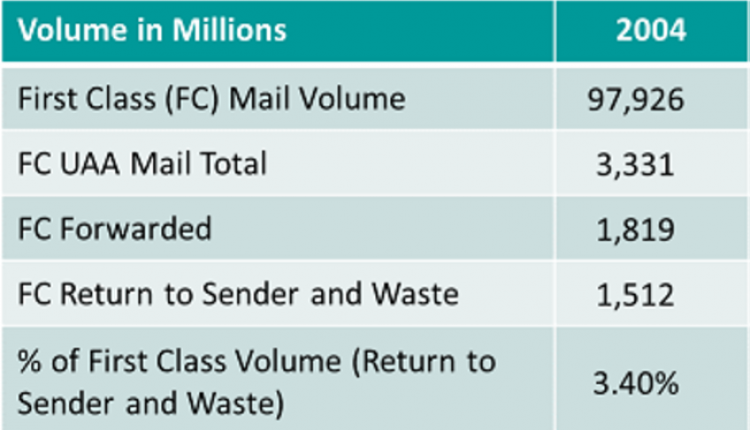This is the time of year is when it always seems to come up. Companies that maintain their own print and mail operations start wondering if they shouldn't be outsourcing some of those functions. The reasoning behind this notion is solid - costs keep going up, volumes are going down, and the ever-popular "not our core competency" argument sound like reasonable foundations upon which a study should be conducted.
The inquiries almost always originate in the Finance department. From their perspective, the decision about who should be responsible for the main channel of communication between the company and its customers is a matter of adding up the fixed and variable costs. Compared to other operations that may be critical to the success of the organization, document generation and distribution must seem like simple tasks that can be done by any number of outside vendors. As a result, the person assigned to gather and analyze the data upon which an outsourcing decision is ultimately based is frequently a junior staff member who is early in their accounting, finance, or project management career.
Inexperience and a narrow focus can result in recommendations that may not take all factors, especially those that are not line items on a profit and loss statement, into account. Important questions are unasked and alternatives unexplored. This is frequently a case of "not knowing what they don't know".
Getting Input from the Experts
Document operations managers may or may not be invited to contribute to the outsourcing evaluation. And their participation is frequently limited to providing statistics, counts, and costs for requested items. This can be a problem. As those who work in document operations know, there are many variables and subtleties that can affect the success of a transition to an outsource provider. Some of these factors are not easily itemized, categorized, or quantified. Reducing the document operations workflow down to a few bullet points just doesn't communicate the complexity of the interwoven systems that are frequently in place.
Document operations managers may have a credibility issue when it comes to assessing their own company's outsourcing options though. Outsourcing frequently means the reduction or elimination of their staff. It might even result in a loss of employment for the managers themselves. Anyone would find it difficult to be objective under such conditions. An analysis they supply may be regarded as biased by the corporate decision-makers.
Perhaps this is why so many organizations find themselves re-evaluating outsourcing decisions again after a few years. If they went with a strict financial analysis they may not have given enough weight to items such as interdepartmental workflow, responsiveness, confidentiality, or new application development. And if they decided against outsourcing based on recommendations from optimistic management they could end up over-staffed and over-equipped.
Outsourcing print and mail operations makes sense under the right conditions. This is especially true today for organizations that were built to process volumes of work that have diminished and have little chance of coming back. Renewing leases on equipment that is severely underutilized may be a difficult business decision to justify, even if the gear is necessary to handle peak production. The need to make investments to upgrade software, hardware, or staff skills to meet modern requirements for customer communications may also come under scrutiny if the company's overall strategy is to convert more paper documents to electronic channels over time.
The inquiries almost always originate in the Finance department. From their perspective, the decision about who should be responsible for the main channel of communication between the company and its customers is a matter of adding up the fixed and variable costs. Compared to other operations that may be critical to the success of the organization, document generation and distribution must seem like simple tasks that can be done by any number of outside vendors. As a result, the person assigned to gather and analyze the data upon which an outsourcing decision is ultimately based is frequently a junior staff member who is early in their accounting, finance, or project management career.
Inexperience and a narrow focus can result in recommendations that may not take all factors, especially those that are not line items on a profit and loss statement, into account. Important questions are unasked and alternatives unexplored. This is frequently a case of "not knowing what they don't know".
Getting Input from the Experts
Document operations managers may or may not be invited to contribute to the outsourcing evaluation. And their participation is frequently limited to providing statistics, counts, and costs for requested items. This can be a problem. As those who work in document operations know, there are many variables and subtleties that can affect the success of a transition to an outsource provider. Some of these factors are not easily itemized, categorized, or quantified. Reducing the document operations workflow down to a few bullet points just doesn't communicate the complexity of the interwoven systems that are frequently in place.
Document operations managers may have a credibility issue when it comes to assessing their own company's outsourcing options though. Outsourcing frequently means the reduction or elimination of their staff. It might even result in a loss of employment for the managers themselves. Anyone would find it difficult to be objective under such conditions. An analysis they supply may be regarded as biased by the corporate decision-makers.
Perhaps this is why so many organizations find themselves re-evaluating outsourcing decisions again after a few years. If they went with a strict financial analysis they may not have given enough weight to items such as interdepartmental workflow, responsiveness, confidentiality, or new application development. And if they decided against outsourcing based on recommendations from optimistic management they could end up over-staffed and over-equipped.
Outsourcing print and mail operations makes sense under the right conditions. This is especially true today for organizations that were built to process volumes of work that have diminished and have little chance of coming back. Renewing leases on equipment that is severely underutilized may be a difficult business decision to justify, even if the gear is necessary to handle peak production. The need to make investments to upgrade software, hardware, or staff skills to meet modern requirements for customer communications may also come under scrutiny if the company's overall strategy is to convert more paper documents to electronic channels over time.
Using Outsourcing to Your Advantage
Outsourcing print and mail is often accompanied by workflow redesign and business process re-engineering. It is inevitable that with exposure to a different viewpoint and new technologies, new ideas will emerge. In a successful outsourcing arrangement, companies take advantage of these opportunities.
Operations managers are key resources as an organization brings a new outsourcing partner into the workflow. The relationship between your company and your outsourcing vendor is an interdependent one; both companies must be in alignment with their business goals and strategic decisions. On an operational level, peers at both companies must be able to communicate effectively to answer questions and fix problems as they come up.
Outsourcing document operations could be the best thing for your organization - or not. Every situation is different, and there is no strategy that will work for everyone. An informed and unbiased assessment is the first step towards success. Should outsourcing be the best decision then working with the service provider as a partner instead of strictly as a vendor will further your chances of reaping the benefits upon which the decision was based.
Outsourcing print and mail is often accompanied by workflow redesign and business process re-engineering. It is inevitable that with exposure to a different viewpoint and new technologies, new ideas will emerge. In a successful outsourcing arrangement, companies take advantage of these opportunities.
Operations managers are key resources as an organization brings a new outsourcing partner into the workflow. The relationship between your company and your outsourcing vendor is an interdependent one; both companies must be in alignment with their business goals and strategic decisions. On an operational level, peers at both companies must be able to communicate effectively to answer questions and fix problems as they come up.
Outsourcing document operations could be the best thing for your organization - or not. Every situation is different, and there is no strategy that will work for everyone. An informed and unbiased assessment is the first step towards success. Should outsourcing be the best decision then working with the service provider as a partner instead of strictly as a vendor will further your chances of reaping the benefits upon which the decision was based.
Sidebar: Cost-per-Piece: Just One of Many Items to Measure
There are many factors to consider when contemplating an outsourcing decision. Here are a few items to think about:
Can an outsource vendor provide capabilities and features that would be impossible for you to match without large capital investments?
Have document volumes fallen to the point that your staff and equipment are underutilized?
Do smaller mail volumes make it difficult to justify the expense of upgrading or replacing hardware or software?
There are many factors to consider when contemplating an outsourcing decision. Here are a few items to think about:
Can an outsource vendor provide capabilities and features that would be impossible for you to match without large capital investments?
Have document volumes fallen to the point that your staff and equipment are underutilized?
Do smaller mail volumes make it difficult to justify the expense of upgrading or replacing hardware or software?
Has mail preparation gotten so complicated that you think it is better left up to professionals who make that their only job?
Have your presort qualification levels changed? Would you benefit from comingling your mail with that of other companies?
Mike Porter is an expert in Print and Mail operations and President of Print/Mail Consultants, an independent consulting firm that helps companies nationwide make strategic decisions about their document operations - and implement them. For more tips visit www.printmailconsultants.com and sign up for Practical Stuff - the free newsletter for document operations. Your comments are welcome. Send them to mporter@printmailconsultants.com.
Have your presort qualification levels changed? Would you benefit from comingling your mail with that of other companies?
Mike Porter is an expert in Print and Mail operations and President of Print/Mail Consultants, an independent consulting firm that helps companies nationwide make strategic decisions about their document operations - and implement them. For more tips visit www.printmailconsultants.com and sign up for Practical Stuff - the free newsletter for document operations. Your comments are welcome. Send them to mporter@printmailconsultants.com.










